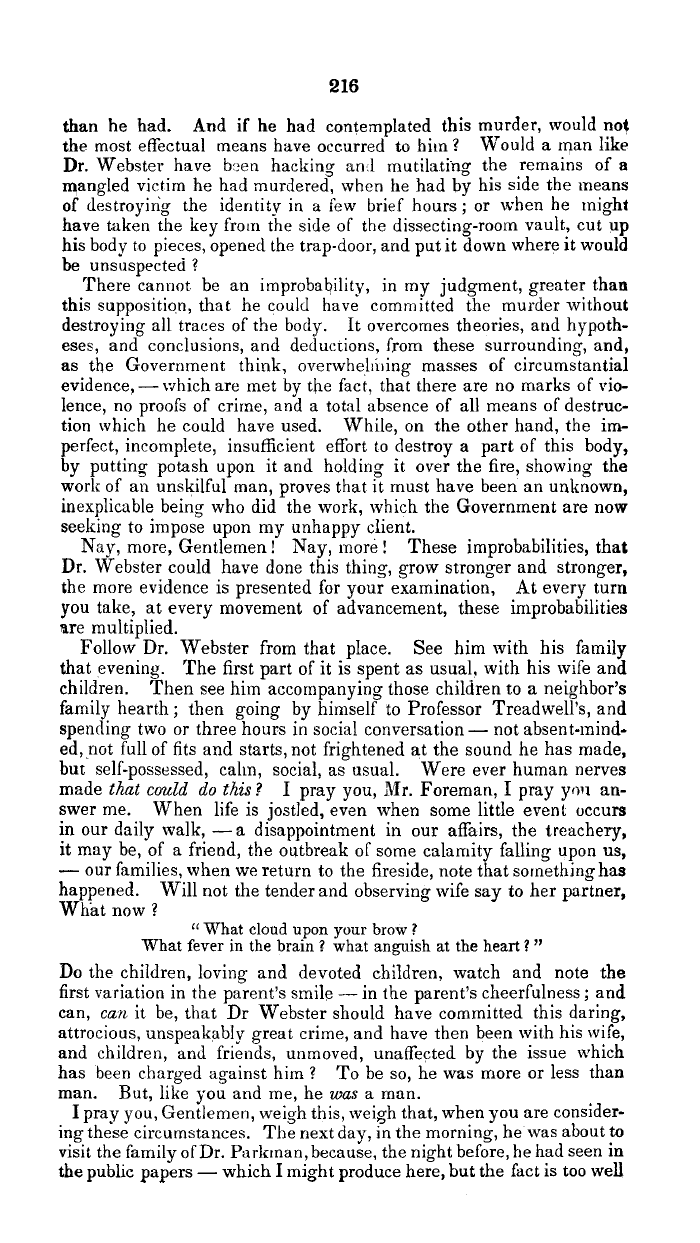|
216
than he had. And if he had contemplated this murder, would not
the most effectual means have occurred to him ? Would a man like
Dr. Webster have b,:en hacking and. mutilating the remains of a
mangled victim he had murdered, when he had by his side the means
of destroying the identity in a few brief hours ; or when he might
have taken the key from the side of the dissecting-room vault, cut up
his body to pieces, opened the trap-door, and put it down where it would
be unsuspected ?
There cannot. be an improbability, in my judgment, greater than
this supposition, that he could have committed the murder without
destroying all traces of the body. It overcomes theories, and hypoth-
eses, and conclusions, and deductions, from these surrounding, and,
as the Government think, overwheliiiing masses of circumstantial
evidence,-which are met by the fact, that there are no marks of vio-
lence, no proofs of crime, and a total absence of all means of destruc-
tion which he could have used. While, on the other hand, the im-
perfect, incomplete, insufficient effort to destroy a part of this body,
by putting potash upon it and holding it over the fire, showing the
work of an unskilful man, proves that it must have been an unknown,
inexplicable being who did the work, which the Government are now
seeking to impose upon my unhappy client.
Nav, more, Gentlemen! Nay, more ! These improbabilities, that
Dr. Webster could have done this thing, grow stronger and stronger,
the more evidence is presented for your examination, At every turn
you take, at every movement of advancement, these improbabilities
are multiplied.
Follow Dr. Webster from that place. See him with his family
that evening. The first part of it is spent as usual, with his wife and
children. Then see him accompanying those children to a neighbor's
family hearth; then going by himself to Professor Treadwell's, and
spending two or three hours in social conversation- not absent-mind-
ed, not full of fits and starts, not frightened at the sound he has made,
but self-possessed, calm, social, as usual. Were ever human nerves
made that could do this? I pray you, Mr. Foreman, I pray ynlt an-
swer me. When life is jostled, even when some little event occurs
in our daily walk, -a disappointment in our affairs, the treachery,
it may be, of a friend, the outbreak of some calamity falling upon us,
- our families, when we return to the fireside, note that something has
happened. Will not the tender and observing wife say to her partner,
What now?
1° What cloud upon your brow ?
What fever in the brain ? what anguish at the heart ? "
Do the children, loving and devoted children, watch and note the
first variation in the parent's smile -in the parent's cheerfulness; and
can, can it be, that Dr Webster should have committed this daring,
attrocious, unspeakably great crime, and have then been with his wife,
and children, and friends, unmoved, unaffected by the issue which
has been charged against him ? To be so, he was more or less than
man. But, like you and me, he was a man.
I pray you, Gentlemen, weigh this, weigh that, when you are consider-
ing these circumstances. The next day, in the morning, he was about to
visit the family of Dr. Parkman, because, the night before, he had seen in
the public papers - which I might produce here, but the fact is too well
|

